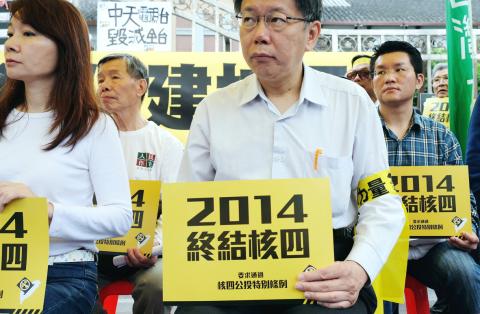Taiwan Power Co (Taipower, 台電) yesterday said the public should consider the possibility of electricity rates being hiked if the Fourth Nuclear Power Plant does not go online.
The comment came in response to former Democratic Progressive Party (DPP) chairman Lin Yi-xiong (林義雄) beginning a hunger strike in Taipei yesterday to protest against the completion of the plant in New Taipei City’s Gongliao District (貢寮) and to encourage the government to recognize that the public is opposed to the plant.
Lin, 72, began his hunger strike at the Gikong Presbyterian Church (義光教會) on Xinyi Road.

Photo: Sam Yeh, AFP
“We respect Mr Lin’s dedication to pushing the government to implement a specific energy policy [to halt construction of the plant], and that is all I can say,” Taipower vice president Roger Lee (李鴻洲) told reporters on the sidelines of a corporate event.
As the supervisor of the plant’s construction, Taipower welcomes the public to express their support or dissent for the Fourth Nuclear Power Plant and nuclear energy, Lee said.
However, one should consider whether there is need to complete construction of the plant from more than one perspective, and people may be required to pay more for non-nuclear plant generated electricity, Lee said.
Taipower plans to finish its security test at the controversial plant by the end of June, as scheduled by the Ministry of Economic Affairs, and will let the government decide whether to install the fuel rods in accordance with its energy policies afterward, he said.
Wu Yu-jen (吳玉珍), a spokesperson for the ministry’s task force on the plant, said Taiwan would face power shortages if the Fourth Nuclear Power Plant does not become operational, since the three operating plants — Jinshan Nuclear Power Plant in Shihmen District (石門) and Guosheng Nuclear Power Plant in Wanli District (萬里) of New Taipei City and Ma-anshan Nuclear Power Plant in Ma-anshan (馬鞍山), Pingtung County — are scheduled to be retired by 2025.
Despite the generation of electricity from alternative energy sources, electricity shortages would remain an issue and would have a considerable impact on households as well as businesses, she said by telephone.
“The shortage issue would only get worse, especially in northern Taiwan,” Wu said.
Taipei uses up to 40 percent of the total electricity generated annually by Taipower nationwide because of its large population.
Taipei residents might face power restrictions sooner than expected, as the Linkou coal-fired power plant in New Taipei City and the Hsieh-ho coal-fired power plant in Keelung are scheduled to be shut down this year.
If the three operating nuclear power plants retired as scheduled in 2025, the country’s total electricity supplies would drop by 40 billion kilowatts a year, if Fourth Nuclear Power Plant was not completed, which would leave up to 90 percent of household demand for electricity unmet, Wu said.

PATENTS: MediaTek Inc said it would not comment on ongoing legal cases, but does not expect the legal action by Huawei to affect its business operations Smartphone integrated chips designer MediaTek Inc (聯發科) on Friday said that a lawsuit filed by Chinese smartphone brand Huawei Technologies Co (華為) over alleged patent infringements would have little impact on its operations. In an announcement posted on the Taiwan Stock Exchange, MediaTek said that it would not comment on an ongoing legal case. However, the company said that Huawei’s legal action would have little impact on its operations. MediaTek’s statement came after China-based PRIP Research said on Thursday that Huawei filed a lawsuit with a Chinese district court claiming that MediaTek infringed on its patents. The infringement mentioned in the lawsuit likely involved

Taipei is today suspending work, classes and its US$2.4 trillion stock market as Typhoon Gaemi approaches Taiwan with strong winds and heavy rain. The nation is not conducting securities, currency or fixed income trading, statements from its stock and currency exchanges said. Authorities had yesterday issued a warning that the storm could affect people on land and canceled some ship crossings and domestic flights. Taiwan Semiconductor Manufacturing Co (TSMC, 台積電) expects its local chipmaking fabs to maintain normal production, the company said in an e-mailed statement. The main chipmaker for Apple Inc and Nvidia Corp said it has activated routine typhoon alert

GROWTH: TSMC increased its projected revenue growth for this year to more than 25 percent, citing stronger-than-expected demand for AI devices and smartphones The Taiwan Institute of Economic Research (TIER, 台灣經濟研究院) yesterday raised its forecast for Taiwan’s GDP growth this year from 3.29 percent to 3.85 percent, as exports and private investment recovered faster than it predicted three months ago. The Taipei-based think tank also expects that Taiwan would see a 8.19 percent increase in exports this year, better than the 7.55 percent it projected in April, as US technology giants spent more money on artificial intelligence (AI) infrastructure and development. “There will be more AI servers going forward, but it remains to be seen if the momentum would extend to personal computers, smartphones and

Catastrophic computer outages caused by a software update from one company have once again exposed the dangers of global technological dependence on a handful of players, experts said on Friday. A flawed update sent out by the little-known security firm CrowdStrike Holdings Inc brought airlines, TV stations and myriad other aspects of daily life to a standstill. The outages affected companies or individuals that use CrowdStrike on the Microsoft Inc’s Windows platform. When they applied the update, the incompatible software crashed computers into a frozen state known as the “blue screen of death.” “Today CrowdStrike has become a household name, but not in